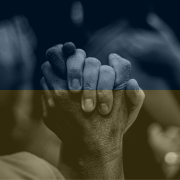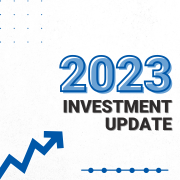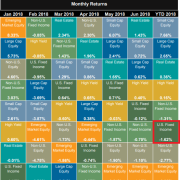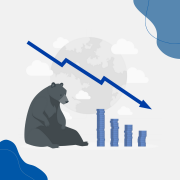Part 1: We Will Prevail
“There are decades where nothing happens; and there are weeks where decades happen.”
– Vladimir Lenin
The words of Lenin, who led the Russian Revolution in 1917, are ringing true in his own country over 100 years later. Russian Prime Minister Vladimir Putin’s decision to invade Ukraine took the world, and financial markets, by storm. For investors, initial instincts may prompt feelings of worry, and rightfully so.
After all, homes are collapsing, buildings are burning, and civilians are being displaced in what publications are calling the biggest war in Europe since 1945. First and foremost, we empathize with the human concerns and humanitarian disaster resulting from Russia’s full-scale invasion of Ukraine. We believe that a broad understanding of the market’s relationship with geopolitical crises, the state of the global economy, and the war’s impact on broad asset classes will help investors navigate this turbulent time.
This series will aim to address the concerns that arise for investors and global markets during such times.
Weathering the Storm
In an era where G20 nations are accustomed to diplomacy, the impact of war on markets may seem foreign. However, we can turn to history to help distinguish relationships between capital returns and warfare. Below is a chart showing the growth of $10,000 invested in the S&P 500 since 1950, overlayed with a myriad of events.
Exhibit A1
Looking back, the S&P 500 grappled with numerous instances of geopolitical turmoil, nationwide systemic meltdowns, and a global pandemic. Despite these vulnerabilities, notice the trend and direction of that initial $10k: it consistently recovers and grows over time Furthermore, Exhibit B features returns 12, 24, and 36 months after the market bottomed in each war.
Exhibit B
These charts convey two things:
- Despite volatile periods, investors have generally been rewarded for putting their capital at risk.
- Human beings are incredibly resilient. We’ve lived through arduous events, gritted our teeth, and made it to the other side.
Some people are comparing this conflict to World War II, but we disagree given that the battle is regionally contained and the US is unlikely to become directly involved. The conflict can, and likely will, get worse. But the probability of another world war is low.
The outcome of Russia’s invasion is difficult to predict. Whether Putin succeeds in establishing a puppet government in Kyiv or a ceasefire is negotiated, we have faith that humankind will persevere and that capital will continue to seek the most efficient allocators, leading to long-term positive returns. In other words, we will prevail.

Phillip Law, Portfolio Analyst
Wealth Advisor, Warren Street Wealth Advisors
Investment Advisor Representative, Warren Street Wealth Advisors, LLC., a Registered Investment Advisor
The information presented here represents opinions and is not meant as personal or actionable advice to any individual, corporation, or other entity. Any investments discussed carry unique risks and should be carefully considered and reviewed by you and your financial professional. Nothing in this document is a solicitation to buy or sell any securities, or an attempt to furnish personal investment advice. Warren Street Wealth Advisors may own securities referenced in this document. Due to the static nature of content, securities held may change over time and current trades may be contrary to outdated publications. Form ADV available upon request 714-876-6200.
Footnotes & Sources:
- Chart is not log-scaled and thus understates market return volatility.










